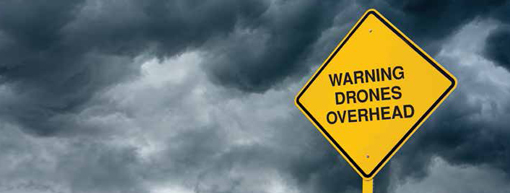
If drones had been available for intelligence-gathering during World War One, ‘many, many lives could have been saved’. The use of unmanned air vehicles (UAVs) might even have helped to break the stalemate on the Western Front and prevent a war of attrition.
So says Professor Sir David Omand, the UK’s former Security and Intelligence Co-ordinator and director of GCHQ, who is chairing the University’s latest policy commission, entitled The Security Impact of Drones: challenges and opportunities for the UK.
‘This technology provides the ability to gather intelligence about what’s on the other side of the hill,’ he explains. ‘If you think back to the Western Front, was it always clear to the commanders what situation they were sending their men into – such as the degree of fortification, whether the enemy troops were occupying the trenches? Had the military been able to acquire that sort of information through the use of drones, many, many lives could have been saved.
‘If drones had been available to both sides, there’s an argument for saying the immobility could have gone on for longer, but there’s also a case for saying that it might have prevented the Western Front solidifying into a war of attrition.’
The Great War commanders and strategists could never have dreamed that within a century it would be possible to gather intelligence from and deploy weapons to far-flung countries using unmanned machines capable of almost pinpoint precision and accuracy. The rise of robot warfare has been so rapid that the ethics surrounding it are still being formulated and hotly debated. Yet the US Air Force now trains more drone ‘pilots’ than bomber and fighter pilots combined.
‘We have designed the last manned combat aircraft we’ll ever build,’ observes Sir David, who has an honorary doctorate from the University of Birmingham. ‘Will the US rely ever more heavily on UAVs to deliver ordnance from the air? Almost certainly.’
The reasons for war might not have changed since 1914, but the way conflict expresses itself certainly has done. ‘One obvious way is in cyber space. Another is in terrorism, sometimes by proxy: states will vie with each other and sponsor terrorism. You have new means by which to exert influence, and this is one area where drones may become important.’
Drone warfare differs from conventional air power because it can greatly reduce the level of violence needed to secure an objective, due to the prompt nature of the response and the precision with which a payload can be delivered.

‘Take the US, for instance, which considers itself to be at war with Al Qaeda: you could probably say that at the moment the trend in policy is to use special forces, drones and cyber attacks, thus avoiding having to express conflict through large-scale armed intervention,’ says Sir David. ‘I think it’s an open question as to how effective that’s going to be, but the technology is here, and there is no doubt that as more nations acquire these capabilities, we may see conflict move on to a different level. If objectives can be secured with lower loss of life and damage, I suppose that is an advance.’
Conversely, the very ease and precision of this new mode may lower the threshold for violence. ‘Will nations and other groups be tempted to resort to force precisely because it doesn’t involve the prospect of huge loss of life and damage and, as a result, the threat of large-scale retaliation? We just don’t know how this will evolve.
And although the risk to innocent civilians may be less through the greater precision of the UAV, it is not zero: all human activity runs the risk of error. There is, therefore, always a great responsibility on the shoulders of those who authorise the use of armed force – and that will be no different with UAV technology.’
Sir David, who has also held the position of Deputy Under-Secretary of State for Policy in the Ministry of Defence, says UAVs are being used by the British military to protect troops on the ground.
‘In Afghanistan, the British Army is using UAVs to detect signs of trouble and then, if necessary, to deal with the threat before casualties are taken. My feeling is that to be able to protect your forces more effectively must be a good thing.
‘The US has gone further and taken a different view to us on the relevant international law and is using the drone technology from attack Al Qaedaassociated terrorists in Pakistan and elsewhere, even when they are not posing an immediate threat to life. The jury’s still out as to whether, in terms of long-term strategy, this is wise; but it’s certainly been effective in the short term.’
But can drone technology actually prevent war – or stop a conflict erupting into widespread violence?
‘There is interesting speculation about whether if we’d had this technology at the time of the Rwandan genocide in 1994, we would have been able to intimidate the rebel leaders early on and stop the move towards the massacres.’
In future, says Sir David, it is possible that even where parliaments are reluctant to put soldiers’ lives at risk by intervening in, say, a civil war, drones might be used to intimidate one side into backing down.
‘Would the Bosnian Serbs have dared to commit the massacres at Srebrenica if drones had been flying overhead? There is an argument for saying they wouldn’t – that they would have been intimidated by knowing they were being observed, as they would have been warned that evidence would be played back at a war crimes tribunal.’
Among the issues being considered by the University policy commission – which is due to be completed by autumn 2014 – is how robot warfare affects the psyche of non-combatant ‘pilots’.
‘We will be looking at whether it is safer to have the ‘pilot’ – or pilots – on the ground, so that there is more than one person to check the evidence; where it’s all done very calmly and the pilots are not highly stressed; where strikes will be more accurate and precise,’ observes Sir David. ‘That’s the upside of such a scenario. But some would argue that there is the risk of getting into video game mentality because you’re not a trained fighter pilot with the disciplines that go with the long training, and you’re not actually taking the risk of being there; you’re sitting in a room many a continent away and you go home to your family at 5pm. Does that introduce a sense of unreality?
‘If you have a fully trained fighter pilot sitting on the ground, he will have experienced the hazards of war. But the next generation may not have been trained to fly combat missions. So will they share the same ethos? Maybe you have to compensate for the detachedness by having a greater oversight of what is going on. I certainly think the training has to be done very carefully; there has to be an ethical formation of the individual, not just technology training.’
What is beyond question, though, is that future wars will now be conducted very differently from previous ones.
‘And, of course, this technology isn’t just about how we fight wars; it also has implications for the police and the intelligence community in terms of surveillance,’ says Sir David. ‘It already has many valuable commercial uses and many more will come as the cost and complication of the technology reduce. Policies for the safe exploitation of these opportunities are needed. That is why the policy commission’s work is necessary and urgent.’
By Ros Dodd